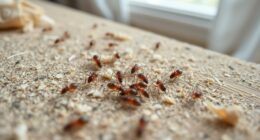If you’re comparing pest tolerance between Rugosa and Hybrid Tea roses, you’ll find Rugosas are more naturally resistant and require less maintenance, thanks to their tough foliage and hardy nature. They can withstand pests like aphids and black spot more effectively, reducing the need for chemical treatments. Hybrid Teas, on the other hand, are more prone to pests and often demand regular care and precise pruning. To discover tips on maintaining healthy, pest-resistant roses, keep exploring these differences.
Key Takeaways
- Rugosa roses are naturally resistant to pests like aphids and black spot, requiring less chemical intervention.
- Hybrid Teas are more susceptible to pests, often needing frequent monitoring and treatment.
- Proper pruning and healthy soil enhance pest resistance in Hybrid Teas, while Rugosas need less maintenance.
- Rugosas’ tougher foliage and hardy nature make them less attractive to pests than Hybrid Teas.
- Overall, Rugosas offer higher pest tolerance and lower maintenance compared to Hybrid Teas.

When choosing between Rugosa and Hybrid Tea roses, understanding their differences can help you pick the right one for your garden. One key aspect to contemplate is their pest tolerance, which directly impacts how much effort you’ll need to invest in maintaining healthy plants. Rugosa roses tend to be more resilient and resistant to common pests like aphids, Japanese beetles, and black spot diseases. Their hardy nature means you might experience fewer infestations and less need for chemical treatments. Hybrid Tea roses, while beautiful and elegant, often attract more pests because they’re more susceptible to common rose ailments. They may require more frequent monitoring and intervention to keep pests at bay, especially in humid or pest-prone environments.
Rugosa roses are more pest-resistant and low-maintenance compared to vulnerable Hybrid Tea roses.
When it comes to pest tolerance, your approach to pruning techniques can influence your roses’ health and resilience. Rugosas benefit from light pruning that maintains their natural shape while removing dead or diseased wood, which helps prevent pest hiding spots. Because Rugosas have tougher, more resistant foliage, they’re less likely to suffer damage from pests that target softer, more delicate leaves. Hybrid Teas, however, often need more precise pruning to promote airflow and reduce disease risk. Proper pruning also helps eliminate weak or damaged growth that pests might exploit, but you should be cautious not to over-prune, which can weaken the plant’s defenses.
Soil requirements also play a significant role in pest tolerance. Rugosa roses thrive in well-drained, slightly acidic to neutral soil that’s rich in organic matter. Healthy soil promotes vigorous growth, making the plant less vulnerable to pest attacks. Conversely, poorly drained or nutrient-deficient soil can stress Hybrid Tea roses, making them more attractive targets for pests and diseases. To boost their resilience, you should regularly amend the soil with compost and ensure proper drainage. A healthy, balanced soil environment enables Hybrid Teas to develop stronger defenses, though they might still require pest control measures.
Additionally, choosing the right fertilization practices can enhance the overall health and pest resistance of your roses. Ultimately, Rugosa roses are your best bet if you want a low-maintenance, pest-resistant option that requires minimal intervention. They’re hardy, adaptable, and better equipped to handle pest pressures naturally. Hybrid Teas, while stunning, demand more attentive care, including strategic pruning and ideal soil conditions, to keep pest problems in check. By understanding these differences and adjusting your pruning techniques and soil management practices accordingly, you can create a thriving rose garden that’s less vulnerable to pests and easier to maintain.
Frequently Asked Questions
Which Rose Variety Needs Less Pruning for Pest Resistance?
You’ll find Rugosa roses need less pruning for pest resistance compared to Hybrid Tea roses. With less frequent pruning, Rugosas maintain their natural defenses and are less vulnerable to pests. Incorporate pest management techniques like proper sanitation and regular inspections alongside moderate pruning. This approach helps keep pests at bay while reducing the need for extensive pruning, making Rugosas a more low-maintenance option for pest resistance.
How Do Climate Conditions Affect Pest Tolerance in These Roses?
Climate conditions markedly influence pest tolerance by affecting how roses adapt and resist. Hot, dry weather can stress plants, making them more vulnerable, while cooler, humid climates may encourage pests. Rugosa roses tend to handle diverse climates better, showcasing strong pest adaptation, whereas hybrid teas might struggle under extreme conditions. You should consider your local climate impact when planting, as it directly impacts pest resistance and overall rose health.
Are There Specific Pests That Prefer Rugosa Roses Over Hybrid Teas?
Certain pests prefer rugosa roses over hybrid teas because of pest attraction and preferences. For example, Japanese beetles often target rugosa roses due to their thick, textured leaves, making them easier to feed on. Conversely, hybrid teas are more prone to aphids and spider mites. Understanding pest preferences helps you choose the right rose for your garden and implement effective pest control strategies.
Can Pest Resistance Be Improved Through Specific Fertilizers?
Think of fertilizer impact like tuning a guitar; the right nutrients can strengthen your roses against pests. While specific fertilizers won’t make roses completely pest-proof, they can boost overall health and resilience. Incorporate pest resistance strategies like organic matter and balanced feeding. Proper fertilization helps plants produce natural defenses, making them less attractive to pests. Regular feeding with appropriate nutrients is a key step in building stronger, pest-resistant roses.
Do Pest Issues in These Roses Impact Their Flowering Quality?
Yes, pest issues can impact the flowering quality of your roses. When pests attack, they weaken the plant, causing stress that reduces bloom size, color vibrancy, and overall bloom production. You might notice fewer flowers or blossoms that don’t last long. Addressing pest problems promptly helps maintain healthy growth, ensuring your roses produce vibrant, plentiful flowers. Regular pest control and monitoring are key to preserving the best flowering quality.
Conclusion
Now that you know the differences in pest tolerance between Rugosa and Hybrid Tea roses, which will you choose to nurture in your garden? Both have their unique charms and resilience, but understanding their strengths helps you make the best decision. Remember, your roses’ health reflects your care—are you ready to embrace the challenge and create a thriving, beautiful oasis? With the right choice, your garden can flourish with vibrant, pest-resistant blooms.









